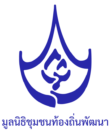Local Development Foundation/Institute
The Local Development Institute (LDI) the operational body Local Development Foundation (LDF) was establishment in 1991 with financial support from Canadian International Development Agency (CIDA) about 151 million baht. Between 1991-1998 LDF/LDI organized the CIDA Fund projects along with the goal of strengthen the capacity for self – determination in poor communities, by enhancing the effectiveness of Thai NGOs and rural development programs for the poor and outputs are an operational and Technical support for community activities and enterprises, linkages between LDI and NGOs and other development agencies and studies and public information on community – based development issues and activities.
In the past experiences of this period LDF/LDF Supported NGOs for totally 221 grant fund for grassroots development projects, 50 loan fund projects, Advocacy Policy research 15 projects, set up the forums in provincial and national level 27 projects etc., (Sec detail in Attachment 1)
The CIDA’s End of Project Report noted that “LDI will likely sustain this leading role, given the prominence of its Executive and Board members in the policy arena. Beside building its own institution building of NGOs and Pos via a variety of supports and CIDA satisfied that LDI was able to channel its funds to grassroots organizations as agreed.
At present LDF/LDI has focused its activities in five areas:
- Civil Society Strengthening
- Environmental Rehabilitation
- Community Business Development
- Advocacy Policy Research Activity
LDI List of successful work during 1991 -2003
NO. |
Project title |
Project duration |
Funder |
Civil Society Strengthening |
|||
1. |
Civil Society Strengthening through local mass media |
Aug – Nov 2001 |
Office of Civil Service Commission |
2. |
Simplifying Healthy City planning into action of 4 pilot provinces |
Aug – 2001 – Apr 2002 |
Office of the National Economic and Social Development Broad |
3 |
National Strategic planning for peoples Empowerment for Drug Abuse crisis Solution. |
Apr – Dec 2001 |
The Government Lottery Office |
4 |
Civil Society strengthening for self Economic Sufficiently |
Jul 2000 – Dec 2001 |
NESDB |
5 |
One Million Baht for One Village Network for Drug Abuse Prevention |
Sep 2001 –Mar 2002 |
The Drug Prevention and Control Office and The Community Organization Development Institute. |
Community Business Development |
|||
6 |
50 Small Enterprise for the poor |
Jan 1994 – Dec 1999 |
CIDA and Credit Union League of Thailand (CULT) |
7 |
One Village, One Product |
Mar 2001 – Feb 2003 |
Canada Fund |
8 |
Community Business Development Training for the Southeast Asia Project |
Nov 2001 –Dec 2002 |
Hanns Seidel Foundation |
Environmental Rehabilitation |
|||
9 |
Community Forestry Policy Advocacy Research |
1992-1995 |
Ford Foundation |
10 |
Good Governance for Better Environment and Quality of Life |
2002-2004 |
Canada Fund |
11 |
Organic Rice Mill in the Northeast for Exportation |
1996-1999 |
The Environmental Fund |
Social Development |
|||
12 |
People Net work Anti Corruption |
2002 -2003 |
Office of Prime Mister |
13 |
Social Capital Building for Better local Community |
2000-2003 |
Aus Aid, The World Environmental Fund |
14 |
Thai citizen right in the global situation |
1999-2000 |
The Thailand Research Fund |
Advocacy Policy Research |
|||
15 |
The Mechanism and Administration for Civil Society development Fund Research |
Mar – Nov 2001 |
The World Bank |
16 |
The Past Present and Future of Thai NGOs |
Jan – Dec 2001 |
Canada Fund |
17 |
A research for Modules of Mass Media Networking on Health Promotion |
Mar 2001 –Dec 2002 |
Ministry of Public Health |
People Network on anti corruption in Thailand ( 2003-2004 )
The aim of Strengthening Accountability Mechanism of People network on Anti Corruption is to strengthen capacity of constitutional and civil society bodies, leading to strengthened ability of the National Counter Corruption Commission (NCCC) and NGOs to enforce higher standards of government accountability. The project was supported budget by the Asian Development Bank (ADB). One of the project components contributing to achievement of the aim is focused on strengthening civil society advocacy and monitoring of accountability mechanism of the network.
An Accountability Commission (AC), Chaired by the NCCC commissioner Mr.Wirat Watthanasiritham and comprised of eminent Thai professionals and citizens, is responsible for overseeing NCCC’s collaboration with civil society. The AC developed criteria for awarding grants to civil society institutes for advocacy and monitoring of accountability mechanism. The AC has also taken a leading role for building a constituency for reform national academics NGOs, community based organization and interested individuals.
As a result of the AC’s decisions, 11 projects were selected and have been implemented by mass media organization, youth network, NGOs and monk network. This group of projects has developed a network of organizations and people for increasing awareness of corruption and encouraging prevention to students and general public. These goals have been achieved through the media, research, manual, training, forums and discussions about corrupt practices. As a result, much information has been gathered, many lessons have been learned, and web site has been created to share this knowledge.
The Local Development Institute (LDI), a national development institute that has been working with government, civil society and grass roots organizations in Thailand since 1991, was contracted by ADB as the project management agent responsible for the overall administration, subcontracting and monitoring of the 11 civil society project holders. LDI has worked in close cooperation with the National Counter Cooperation Commission, the Executing agency for the project.

